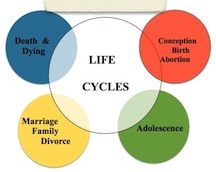In preparation for today’s discussion of Conception, Birth and Abortion, Betty Lamb read a poem entitled “Tis Mother.”
Safeta Cerimovic of the Ahmadiyya Muslim Community and Cindy Rahrle from the Church of Jesus Christ of Latter-Day Saints began our discussion by sharing their personal beliefs on these topics, beliefs which are informed by the doctrines of their respective faiths. We were all encouraged to participate by sharing own stories and spiritual teachings from our own traditions.
Cindy is very involved in mentoring young ladies ages 12-18 in her church. Girls are given a booklet “True to the Faith,” which gives the church’s position on many matters including those surrounding pre-marital conduct, birth and abortion. Teachers/women in the church meet regularly with groups of girls to help them develop “personal armor from a higher power” to stay “pure” and true to their values and faith. The church teaches that parents must make their own informed decision about letting their children participate in sex education classes in school. Cindy believes young people should understand reproductive biology, but sex education should stress abstinence as the only acceptable form of birth control. Families can choose to opt out of sex education in the schools if they don’t want their children given specific information about other ways to prevent pregnancy.
The church teaches that life is precious and begins at conception. There are three realms of life, the first of which is “spirit children” waiting to be born. Only when spirit children are given the chance to be born into this world (realm two) can they prove their worth to God and enter eternal life with Jesus (realm three) upon death. While the church does not prohibit contraception, members know that many spirit children are waiting to enter the world. Women who have children out of wedlock are not abandoned and condemned, but supported by the community.
The church denounces abortion based on the commandment “Thou shall not kill.” It counsels its members not to submit to or perform an abortion except in rare cases–incest, rape, extreme health risk to the mother, catastrophic problem with the baby–and then only after counseling with the local priesthood authority and after receiving divine confirmation in prayer.
Men who hold the Melchizedek Priesthood can bless babies, usually a few weeks after they are born. During the ceremony the priest says a prayer, bestows a blessing, and gives the baby a name chosen by the parents. Baptism does not occur until the age of eight, the age of accountability when each child can choose to follow Christ for him/herself.
Cindy stressed that the church is strongly centered on family relationships and is focused on teaching the youth of the church to follow the path of faith and service to others.
Safeta said that Muslims can use contraception; however, Islam does not permit preventing pregnancy if the only reason is financial. Muslims believe that Allah will provide and does not burden any soul above his/her capacity.
Premarital sex and even dating are forbidden in the Islamic faith. If a girl got pregnant outside of marriage, she would still be welcomed in many Muslim communities; however, there are areas where harsh cultural traditions could result in her punishment or death. Muslims permit abortion only if the child is endangering the life of the mother. Infertile couples can turn to artificial insemination as long as it is husband to wife only—no sperm/egg donors or surrogate mothers.
In the Muslim tradition, birth is celebrated. A ritual is performed when a baby is born: the father or an Imam recites prayers in the baby’s ears left to right and gives him his name which has been picked by the parents. The idea is to tell the child that he/she is created to worship God and serve mankind. Male circumcision is required, but ceremonies surrounding this largely depend upon local culture. In Bosnia, where Safeta grew up, it can be performed in a hospital or later at home, and is accompanied by gifts of money for the baby. Baby girls are often given monetary gifts when their ears are pierced. In the Muslim tradition, birth is celebrated.
Safeta said that in the Ahmadiyya Muslim Community women expect to dedicate their child to service to God; at 16 the child can affirm this choice and serve his religious community in a variety of ways.
Death, even of a young baby, is a return to God. While it is normal to feel sad, Muslims are called upon to let go of this child and trust in God’s plan, because in the Holy Qur’an is stated that to God we belong and to Him we will return.
In the discussion which followed, several women shared Jewish traditions. Conception begins when the head and shoulder of the baby come out. Abortion is barely mentioned in the scriptures. In the event of a traumatic birth (where Catholic teaching would say save the fetus), Jewish teaching prioritizes saving the life of the mother because she is already living. There is a range of opinion on the use of contraception depending upon where a believer falls on the Orthodox-Reformed spectrum.
Male circumcision is a covenant required in Judaism. A bris can be performed by a doctor or a mohel trained to perform the ritual circumcision. It often happens in the home, about eight days after birth, accompanied by a family celebration.
Before parting, we stood together in a circle holding hands as Penny Hart reflected on the bonds that draw us close as women facing very intimate and profound issues around the beginning of life.

